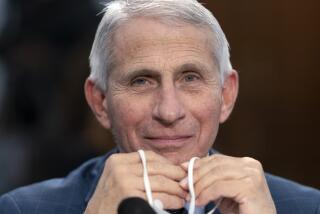Panetta Will Announce Plans to Step Down, Aides Say
WASHINGTON — White House Chief of Staff Leon E. Panetta, a Californian who helped bring internal order and an air of discipline to the West Wing in the difficult days of 1994, will soon announce his resignation, aides said Tuesday.
The news, long anticipated, is expected to begin a rush for the exits by many in the White House and Cabinet before a second Clinton term gets underway.
In a television interview Tuesday night, Panetta confirmed that he plans to leave the White House at some point, but said no decision on timing has been made.
“The president has made absolutely no decisions,” he said. “And I’ve made no decisions as to what I’m going to do. It’s no mystery that at some point, I’d like to go back to California. But right now we want to celebrate this victory and then begin to work on the transition.”
A longtime congressman from Carmel Valley, Panetta was Clinton’s budget director before joining the White House in June 1994, at a time when Clinton was filling out his staff with more-experienced Washington hands.
He has been one of the most visible faces on the White House team and has often helped the administration tend to California’s special needs. He became a budget expert during his years in Congress and was a leading anti-deficit hawk in the private councils of the White House.
Panetta was a leading strategist in the prolonged battle over the federal deficit in late 1995. Because of his experience in Congress, he often played the role of top White House emissary to the House and Senate.
During his time in Congress, Panetta was known for his unusual candor. But his free-speaking ways landed him in trouble when he first joined the administration. More recently, he has been known for his carefully measured words.
Leading candidates to replace Panetta, aides said, are Erskine Bowles, a Clinton favorite and former deputy chief of staff; Harold M. Ickes, a deputy chief of staff; Samuel “Sandy” Berger, deputy national security advisor; Commerce Secretary Mickey Kantor; and Treasury Secretary Robert E. Rubin.
Panetta is expected to step down sometime after the inauguration. His next move isn’t known, but there has been talk that he would mount a campaign to become California governor when Pete Wilson leaves office in 1998.
Panetta has declined to comment on any of his post-Washington intentions, other than to mention his desire to return to his family walnut farm in Northern California.
Asked recently whether he dreamed late at night of becoming governor, he answered: “Late at night I dream of Carmel Valley.”
Bowles, who runs a huge investment pool, has told associates that he does not wish to leave his business commitments. But he has become a special favorite of Clinton, as both an administrator and a friend, and has a wide following among the staff.
A former director of the Small Business Administration, Bowles was persuaded by Clinton to remain in Washington long after he intended to leave. When he finally did depart, he said it was for family reasons. But Bowles has since told people in the administration that his children are old enough that he now feels freer to leave home.
He lent a hand during the Clinton-Gore campaign and is already at work on the presidential transition.
A move by Rubin to the White House would be a more unusual career step, especially since he has won favorable reviews from many quarters for his stewardship of economic affairs.
A list of departing administration officials is expected to be released within days by Panetta himself.
Among the expected departees are two other Californians, Secretary of State Warren Christopher and Defense Secretary William J. Perry; also expected to leave are Transportation Secretary Federico Pena, Energy Secretary Hazel O’Leary, Labor Secretary Robert B. Reich and Housing Secretary Henry G. Cisneros.
Times staff writer Faye Fiore contributed to this story.
More to Read
Get the L.A. Times Politics newsletter
Deeply reported insights into legislation, politics and policy from Sacramento, Washington and beyond. In your inbox three times per week.
You may occasionally receive promotional content from the Los Angeles Times.











